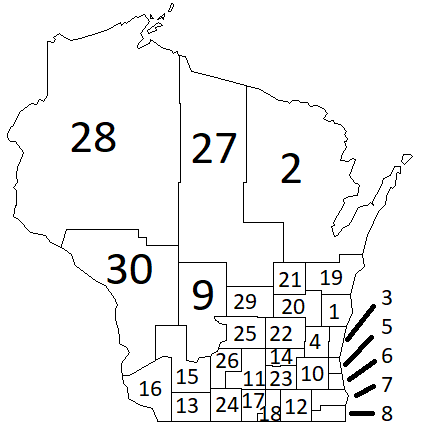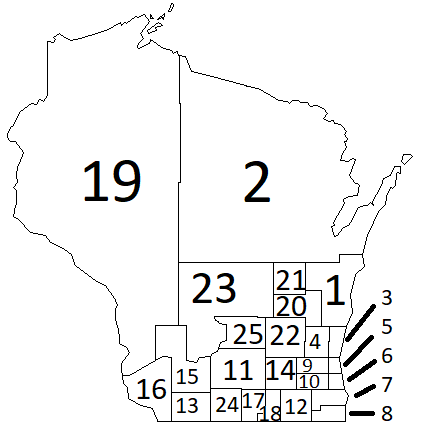10th Wisconsin Legislature on:
[Wikipedia]
[Google]
[Amazon]
The Tenth Wisconsin Legislature convened from January 14, 1857, to March 9, 1857, in regular session.
This was the first legislative session after the expansion and
1857 Act 8
This was an attempt to make it more difficult to arrest people on accusation that they were fugitive slaves. It also introduced severe penalties for falsely claiming a person as a fugitive slave. * February 28, 1857: Act providing for the erection of the main edifice of the State University
1857 Act 25
* February 28, 1857: Act authorizing the enlargement of the State Capitol, and providing and appropriating means for the payment of the same
1857 Act 26
* March 4, 1857: Act to extend the right of
1857 Act 44
This was the second attempt to create a referendum which would grant voting rights to African American men in Wisconsin. The first referendum passed, but was deemed illegitimate. This referendum would fail in the 1857 election. Ultimately, the
1857 Act 85
* March 9, 1857: Act to provide for the appointment of a Superintendent of Public Property and to define his powers and duties
1857 Act 95




1856 Wisconsin Act 109
passed into law in the


redistricting
Redistricting in the United States is the process of drawing electoral district boundaries. For the United States House of Representatives, and state legislatures, redistricting occurs after each ten-year census.
The U.S. Constitution in Art ...
of the Senate and Assembly according to an act of the previous session. The Senate grew from 25 to 30 seats; the Assembly grew from 82 to 97 seats.
Senators representing odd-numbered districts were newly elected for this session and were serving the first year of a two-year term. Assembly members were elected to a one-year term. Assembly members and odd-numbered senators were elected in the general election of November 4, 1856. Senators representing even-numbered districts were serving the second year of their two-year term, having been elected in the general election held on November 6, 1855, or were elected in the 1856 election for a newly created district and were serving a one-year term.
The governor of Wisconsin
The governor of Wisconsin is the head of government of Wisconsin and the commander-in-chief of the state's Wisconsin Army National Guard, army and Wisconsin Air National Guard, air forces. The governor has a duty to enforce state laws, and the ...
during this entire term was Republican Coles Bashford
Coles Bashford (January 24, 1816April 25, 1878) was an American lawyer and politician who became the fifth governor of Wisconsin, and one of the founders of the U.S. Republican Party. His one term as governor ended in a bribery scandal that ende ...
, of Winnebago County, serving the second year of a two-year term, having won election in the 1855 Wisconsin gubernatorial election
The 1855 Wisconsin gubernatorial election was held on November 6, 1855. Republican Party candidate Coles Bashford was declared the winner after a court challenge, defeating Democratic incumbent William A. Barstow.
Barstow was initially dec ...
.
Major events
* January 23, 1857:James Rood Doolittle
James Rood Doolittle Sr. (January 3, 1815July 27, 1897) was an American lawyer, politician, and Wisconsin pioneer. He represented Wisconsin for 12 years as a United States senator, from March 4, 1857, to March 4, 1869. During ...
elected United States Senator
The United States Senate consists of 100 members, two from each of the 50 U.S. state, states. This list includes all senators serving in the 119th United States Congress.
Party affiliation
Independent Senators Angus King of Maine and Berni ...
by the Wisconsin Legislature in joint session.
* March 4, 1857: Inauguration
In government and politics, inauguration is the process of swearing a person into office and thus making that person the incumbent. Such an inauguration commonly occurs through a formal ceremony or special event, which may also include an inau ...
of James Buchanan
James Buchanan Jr. ( ; April 23, 1791June 1, 1868) was the 15th president of the United States, serving from 1857 to 1861. He also served as the United States Secretary of State, secretary of state from 1845 to 1849 and represented Pennsylvan ...
as the 15th President of the United States
The president of the United States (POTUS) is the head of state and head of government of the United States. The president directs the Federal government of the United States#Executive branch, executive branch of the Federal government of t ...
.
* November 3, 1857: Alexander Randall elected Elected may refer to:
* "Elected" (song), by Alice Cooper, 1973
* ''Elected'' (EP), by Ayreon, 2008
*The Elected, an American indie rock band
See also
*Election
An election is a formal group decision-making process whereby a population ch ...
Governor of Wisconsin
The governor of Wisconsin is the head of government of Wisconsin and the commander-in-chief of the state's Wisconsin Army National Guard, army and Wisconsin Air National Guard, air forces. The governor has a duty to enforce state laws, and the ...
.
Major legislation
* February 19, 1857: Act relating to the writ ofHabeas Corpus
''Habeas corpus'' (; from Medieval Latin, ) is a legal procedure invoking the jurisdiction of a court to review the unlawful detention or imprisonment of an individual, and request the individual's custodian (usually a prison official) to ...
to persons claimed as Fugitive Slaves
In the United States, fugitive slaves or runaway slaves were terms used in the 18th and 19th centuries to describe people who fled slavery. The term also refers to the federal Fugitive Slave Acts of 1793 and 1850. Such people are also called fre ...
, the right of trial by jury, and to prevent kidnapping in this State1857 Act 8
This was an attempt to make it more difficult to arrest people on accusation that they were fugitive slaves. It also introduced severe penalties for falsely claiming a person as a fugitive slave. * February 28, 1857: Act providing for the erection of the main edifice of the State University
1857 Act 25
* February 28, 1857: Act authorizing the enlargement of the State Capitol, and providing and appropriating means for the payment of the same
1857 Act 26
* March 4, 1857: Act to extend the right of
Suffrage
Suffrage, political franchise, or simply franchise is the right to vote in public, political elections and referendums (although the term is sometimes used for any right to vote). In some languages, and occasionally in English, the right to v ...
1857 Act 44
This was the second attempt to create a referendum which would grant voting rights to African American men in Wisconsin. The first referendum passed, but was deemed illegitimate. This referendum would fail in the 1857 election. Ultimately, the
Wisconsin Supreme Court
The Wisconsin Supreme Court is the Supreme court, highest and final court of appeals in the state judicial system of the U.S. state of Wisconsin. In addition to hearing appeals of lower Wisconsin court decisions, the Wisconsin Supreme Court also ...
would rule in the 1866 case of '' Gillespie v. Palmer'' that the earlier referendum was valid, and that African American men would have the right to vote in the state.
* March 7, 1857: Act to preserve the purity of Elections1857 Act 85
* March 9, 1857: Act to provide for the appointment of a Superintendent of Public Property and to define his powers and duties
1857 Act 95
Party summary
Senate summary
Assembly summary
Sessions
* 1st Regular session: January 14, 1857 – March 9, 1857Leaders
Senate leadership
* President of the Senate:Arthur MacArthur Sr.
Arthur MacArthur Sr. (January 26, 1815August 26, 1896) was a Scottish immigrant to America, lawyer, and judge. He was the fourth governor of Wisconsin and was an associate justice of the Supreme Court of the District of Columbia. He was the fathe ...
, Lieutenant Governor
A lieutenant governor, lieutenant-governor, or vice governor is a high officer of state, whose precise role and rank vary by jurisdiction. Often a lieutenant governor is the deputy, or lieutenant, to or ranked under a governor — a "second-in-comm ...
* President pro tempore:
Assembly leadership
* Speaker of the Assembly:Wyman Spooner
Wyman Spooner (July 2, 1795 – November 18, 1877) was an American printer, lawyer, politician, and Wisconsin pioneer. He was the 9th Lieutenant Governor of Wisconsin, the 10th Speaker of the Wisconsin State Assembly, and President pro tempo ...
Members
Members of the Senate
Members of the Wisconsin Senate for the Tenth Wisconsin Legislature (30):Members of the Assembly
Members of the Assembly for the Tenth Wisconsin Legislature (97):Employees
Senate employees
* Chief Clerk: William Henry Brisbane * Sergeant-at-Arms: Alanson FilerAssembly employees
* Chief Clerk:William C. Webb
William Craw Webb (April 21, 1824April 19, 1898) was an American lawyer, Republican politician, and pioneer of Wisconsin and Kansas. He was the first Kansas Insurance Commissioner, served as a member of the Kansas House of Representatives and ...
* Sergeant-at-Arms: William C. Rogers
Changes from the 9th Legislature
The most significant structural change to the Legislature between the 9th and 10th sessions was the reapportionment and redistricting of legislative seats. The new districts were defined i1856 Wisconsin Act 109
passed into law in the
9th Wisconsin Legislature
The Ninth Wisconsin Legislature convened from January 9, 1856, to March 31, 1856, in regular session, and re-convened from September 3, 1856, to October 14, 1856.
This was a pivotal legislative session in the fall of the Democratic Party in W ...
.
Senate redistricting
Summary of changes
* 17 senate districts were left unchanged. * Dane County went from having one senator to two (11, 26). * Jefferson County went from having one senator to two (14, 23). * Marquette County became its own senate district (29), after previously having been in a shared district with Adams, Sauk, and Waushara counties. * Sheboygan County became its own senate district (1), after previously having been in a shared district with Calumet and Manitowoc counties * Waukesha County went from two senators to one (10). * The multi-county, lightly-populated northern and western regions of the state went from two senators to four (2, 27, 28, 30).Senate districts


Assembly redistricting
Summary of changes
* Brown County became its own assembly district, after previously having been in a shared district with Door and Kewaunee counties. * Columbia County went from having 2 districts to 3. * Dane County went from having 5 districts to 6. * Fond du Lac County went from having 4 districts to 5. * Green County went from having 1 district to 2. * Manitowoc County went from having 1 district to 2. * Marquette County went from having 1 district and 1 shared district with Waushara to having 2 districts. * Outagamie County became its own assembly district, after previously having been in a shared district with Oconto and Waupaca counties. * Rock County went from having 4 districts to 5. * Sauk County went from sharing a district with Adams to having 2 districts of its own. * Sheboygan County went from having 2 districts to 3. * Walworth County went from having 6 districts to 4. * Washington County went from having 2 districts to 3. * Waupaca County became its own assembly district, after previously having been in a shared district with Oconto and Outagamie counties. * Waushara County became its own assembly district, after previously having been in a shared district with Marquette * Winnebago County went from having 2 districts to 3.Assembly districts
References
External links
{{Wisconsin legislatures 1857 in WisconsinWisconsin
Wisconsin ( ) is a U.S. state, state in the Great Lakes region, Great Lakes region of the Upper Midwest of the United States. It borders Minnesota to the west, Iowa to the southwest, Illinois to the south, Lake Michigan to the east, Michig ...
Wisconsin legislative sessions